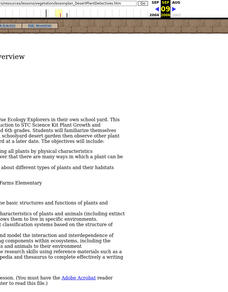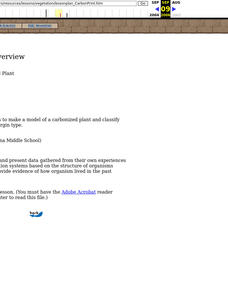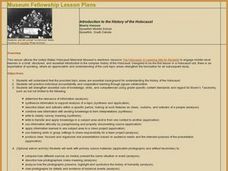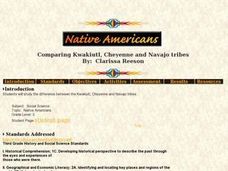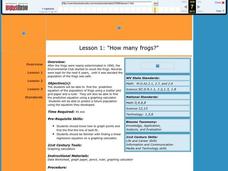Curated OER
Insects A-Z!
Alphabet insects! Who has ever heard of such a thing? Get ready because your class is going to research insects that start with a specific letter of the alphabet. In small groups, they'll use the Internet and reference texts to locate...
Montana Natural History Center
Studying Grassland Ecosystems
At first glance, grassland ecosystems might seem dull and uninteresting, but once you start to explore it's amazing the things you'll find! Through this series of engaging lessons, activities, and experiments, elementary students examine...
Virginia Department of Education
Adaptation and Evolution
Um may be the atomic symbol for confusion, but it won't be needed in this lesson. Scholars rotate through seven stations completing experiments, hands-on activities, writing exercises, and analysis. Stations include material on...
Curated OER
Desert Plant Detectives
Students examine and categorize plants in their own schoolyard desert garden and then observe other plant areas of their schoolyard.
Curated OER
"Fossil" of a Carbonized Plant
Students use leaves to make model of a carbonized plant and classify leaves by shape and margin type.
Curated OER
Creating a School Herbarium
Students develop working knowledge of common plants and awareness of plant diversity by starting a school herbarium.
Curated OER
Request
Students play a game of questioning with the teacher after reading silently a beginning passage of text. They and teacher request specific information from each other until students are able to summarize and predict the outcome of the...
Curated OER
Appearances Are Deceiving
Young scientists study creeks around their area to see how clean the water really is. One way to tell is by the invertebrate populations that are present. This lesson plan introduces a game which learners simulate a variety of species...
Curated OER
Introduction to the History of the Holocaust
The Holocaust is unbelievable! Examine this piece of history with your class. Using the Internet, research groups determine the relevance of information presented, compare how different sites present the same information, synthesize...
Curated OER
Lesson Plan for C.S Lewis’ The Magician’s Nephew
Here is a lesson that incorporates music writing, and reading literature. The class reads chapter eight from the C.S. Lewis classic The Magician's Nephew. Then, just like in the story, they use music as inspiration to create (write)...
Curated OER
Comparing Kwakiutl, Cheyenne and Navajo tribes
Third graders study the difference between the Kwakiutl, Cheyenne and Navajo tribes. They identify the people, resources, lifestyle and beliefs of the Kwakiutl, Cheyenne, and Navajo Indians. Afterward, they present their projects on each...
Curated OER
How Many Frogs?
Students explore the concept of linear regression. In this linear regression lesson, students find the line of best fit for a set of data pertaining to a frog population. Students use their line of best fit to predict the frog population...
Curated OER
Dot Plots
Number crunching statisticians explore displaying data with dot plots and define the difference between quantitative data and qualitative data. Dot plots are created based on a set of given data and analyzed.
Curated OER
DNA: Expressions in Agriculture
What is DNA extraction, and can you make a living doing it? Yes, if you are in a biotechnology field. Kids learn about DNA extraction, GMOs, and biotechnology careers. They then watch videos and complete activities to understand the use...
Curated OER
Do We Need to Wear a Rainhat? Acid Rain: Causes, Effects, and Possible Solutions
Acid rain, and how it affects the environment, is the focus of this Earth science lesson. During the study, learners evaluate measures to reduce acid rain, and design an investigation to demonstrate the conection between a hypothesis and...
Curated OER
Project Based Learning
What is Project-Based learning? Find out with a great informaitonal article that includeds multiple web and lesson links. Positive aspects of investigative and project based learning are some highlights you'll read about.
Curated OER
Video Game Violence: Explore Possible Impacts
Introduce middle schoolers to the issue of video game violence with a multifaceted approach. Learners complete a gaming survey, as well as read and discuss a news feature about violent video game sales and a handout on stimulus...
Curated OER
Cyrano de Bergerac: QAR Strategy
Designed as a postreading activity for Act II of Cyrano de Bergerac, this resource uses the QAR strategy to get readers thinking deeper about the texts they're reading. Explicit directions for the teacher are included, so don't fret if...
Curated OER
Dandelion Wine: Questioning Strategy
Readers of Dandelion Wine work in groups to develop questions on four levels (right there, think and search, the author and you, and on my own) about Chapter 34 of Ray Bradbury's reflection on the joys of summer. Groups jigsaw and...
Curated OER
Hiroshima: Question Answer Response Strategy (QAR)
“The crux of the matter is whether total war in its present form is justifiable. . .” After reading “The Aftermath,” the final chapter of Hiroshima, class members use a Question Answer Response (QAR) strategy to reflect on issues raised...
Curated OER
Mississippi Trial, 1955: K-W-H-L Strategy
To prepare for a reading of Christopher E. Crowe's Mississippi Trial, 1955, class members create a KWHL chart and begin by generating questions they have about the civil rights movement, slavery, and the death of Emmett...
Curated OER
Regarding the Fountain: Questioning Strategy—Cubing
Look deeper into the text with a reading strategy based on asking critical thinking questions. While reading Reading the Fountain by Kate Klise, learners think of questions that help them describe, compare, associate, analyze,...
Curated OER
The Outsiders: Question Answer Relationships Strategy
Kids learn best when asking questions about what they have read. Encourage active reading with a comprehension activity based on S.E. Hinton's The Outsiders, in which kids read passages from the beginning of the book and identify...
Novelinks
The Tempest: QAR
Asking questions about a text is an effective way to improve reading comprehension. Apply the Question Answer Response strategy to your unit on William Shakespeare's The Tempest. As kids read each passage, they decide if the answer...





